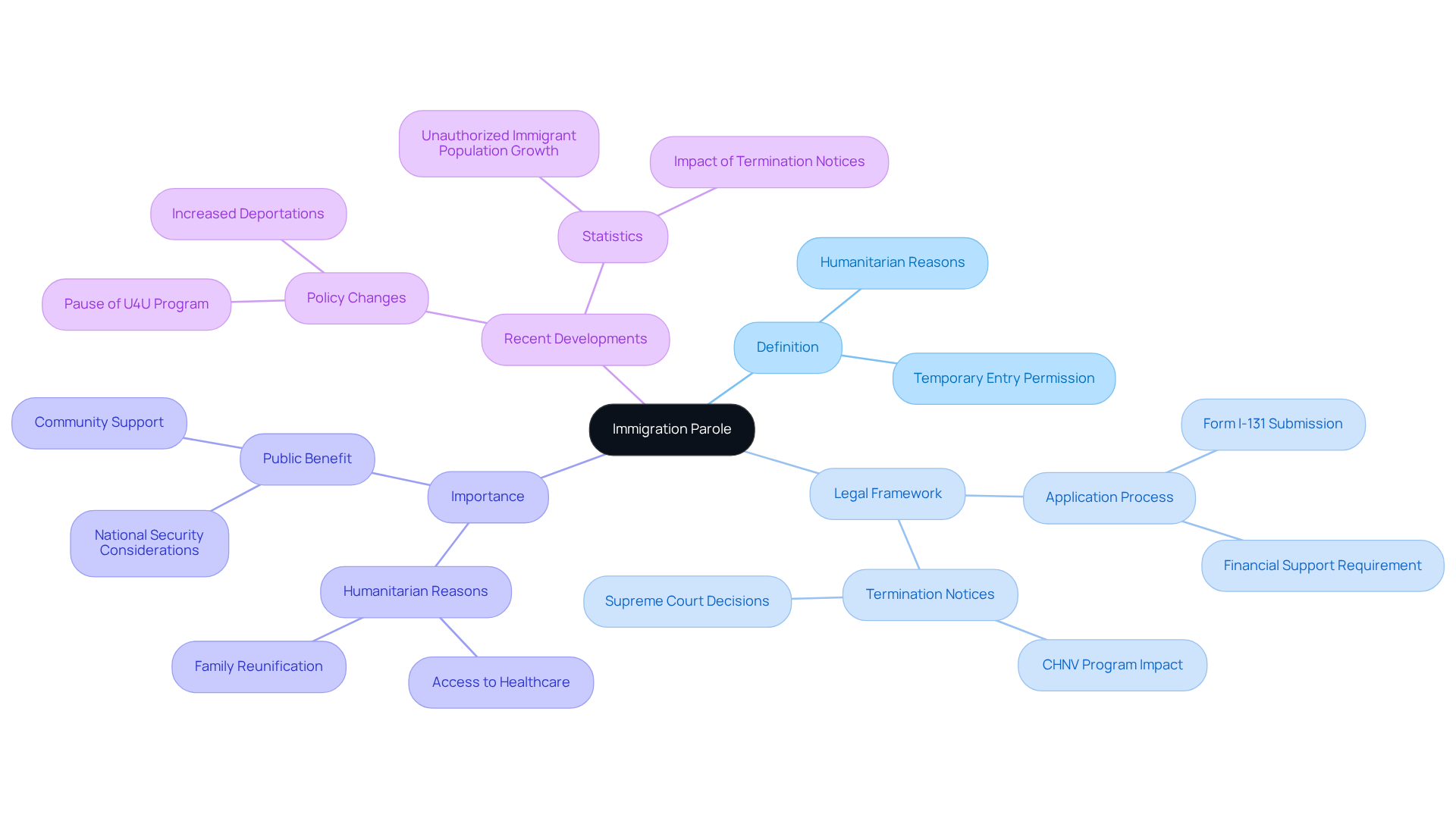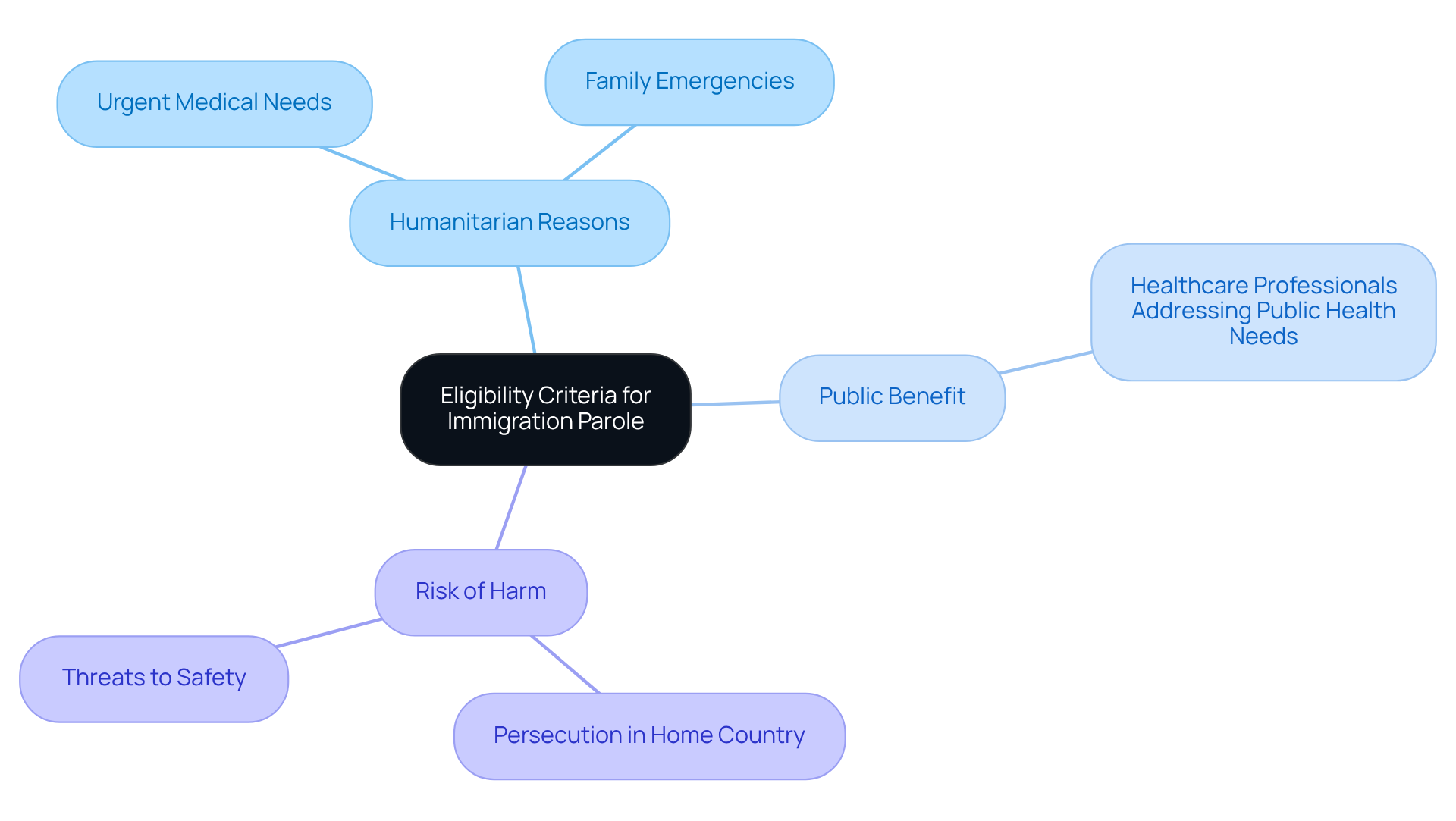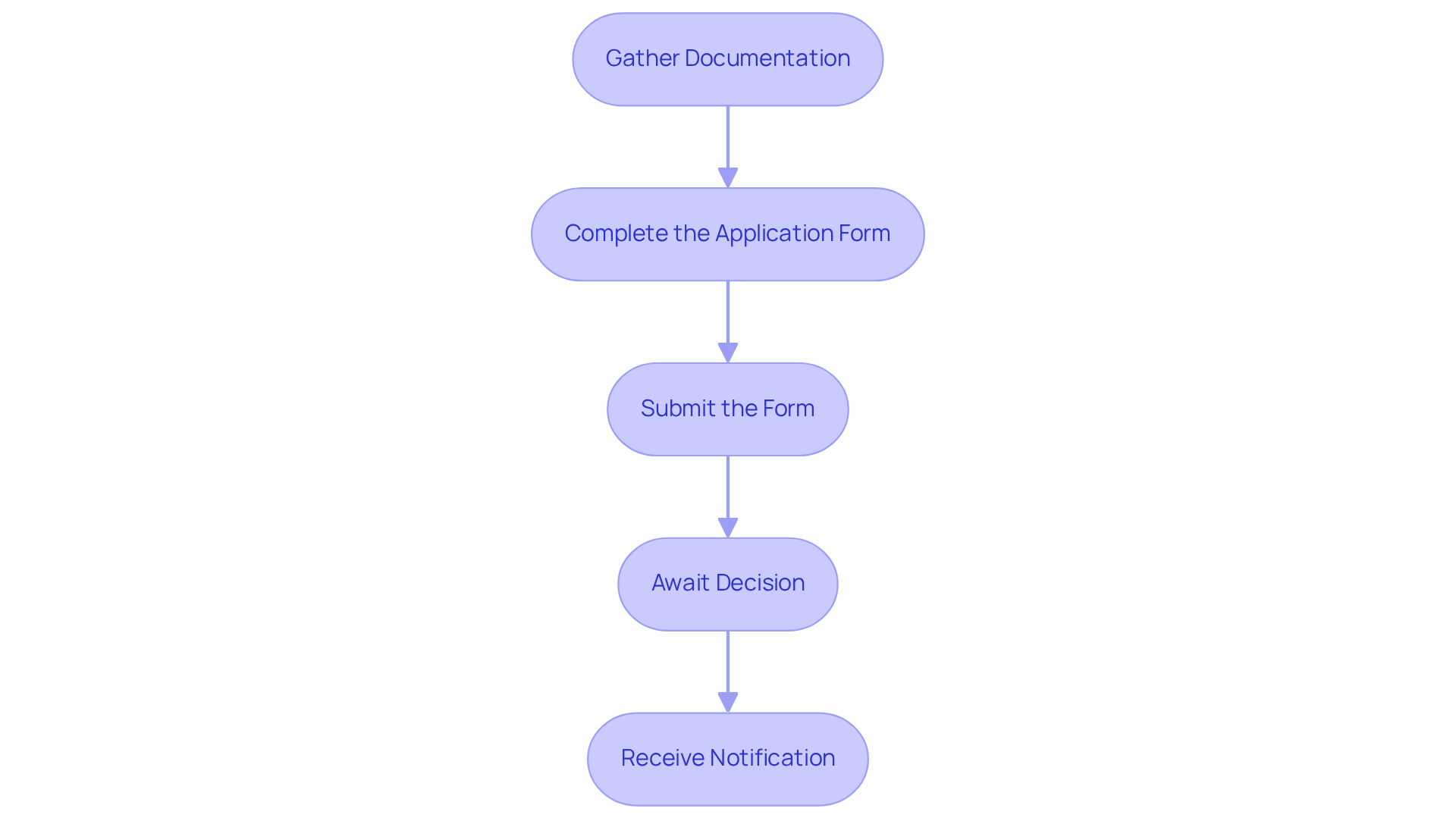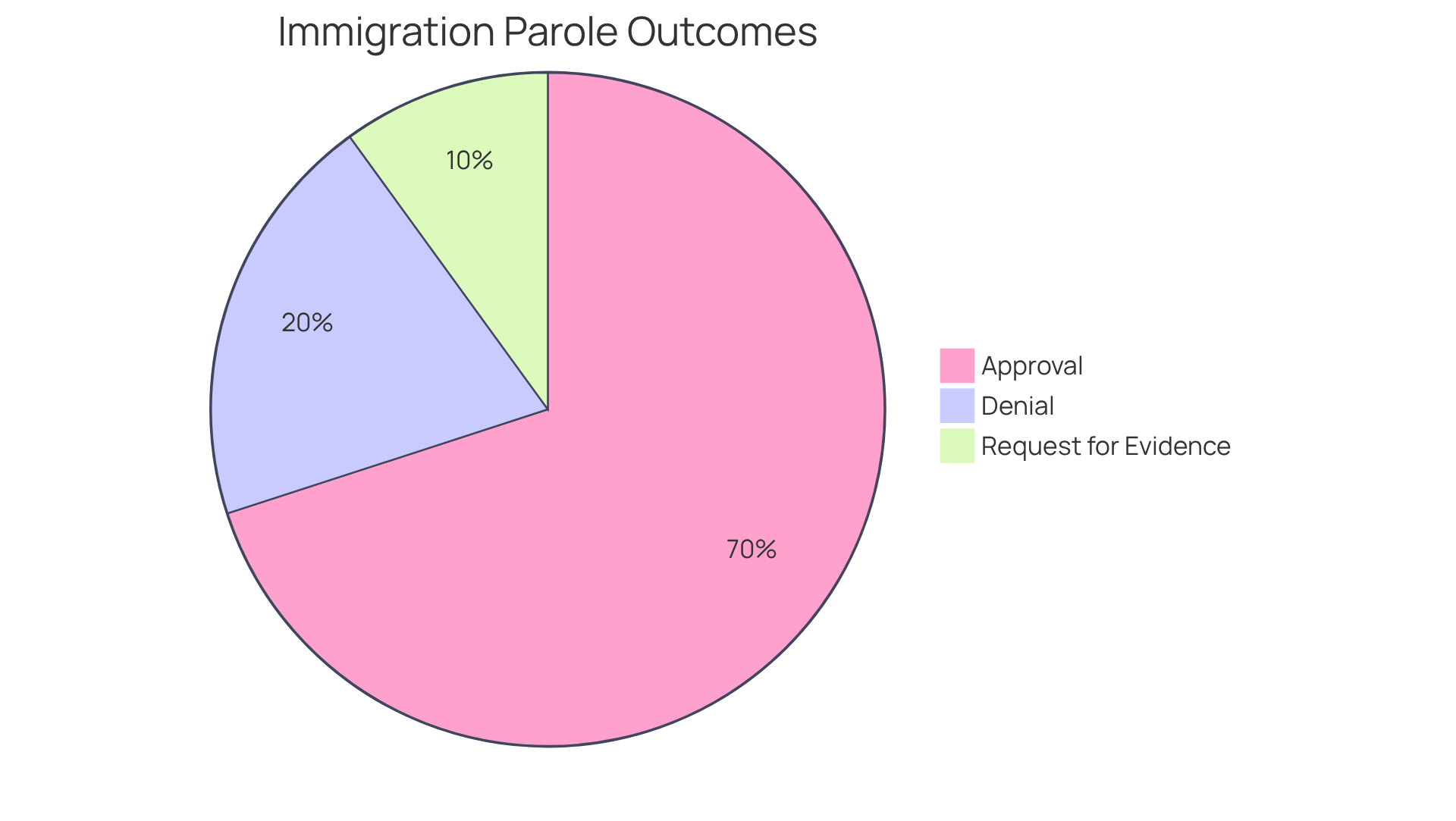Overview
Immigration parole is a lifeline for those facing urgent humanitarian challenges or significant public benefit needs. It allows individuals to temporarily enter the United States when traditional visas aren’t an option. Have you ever felt lost in the immigration process? You’re not alone.
This article breaks down the eligibility criteria and application process in plain language, ensuring you understand what’s required. It’s crucial to have thorough documentation, as the evolving nature of immigration policies can impact approval rates. We understand how overwhelming this feels, but you don’t have to face it alone—we’re here to guide you every step of the way.
Remember, your future matters to us. We’re in this fight with you, ready to help you navigate these challenges. Yo Peleo — We Fight.
Introduction
Immigration parole shines as a beacon of hope for those seeking temporary refuge in the United States, especially during urgent humanitarian crises. This legal mechanism opens doors for individuals facing life-threatening situations and highlights the need for compassionate immigration policies in a rapidly changing world. But with an approval rate lingering below 40% in recent years, many potential applicants find themselves asking: what does it truly take to navigate the complexities of immigration parole successfully?
Have you ever felt lost in the immigration process? You’re not alone. We understand how overwhelming this feels, and it’s important to know you have rights, even if others tell you otherwise. Together, we can tackle these challenges head-on.
Define Immigration Parole: Legal Framework and Importance
Immigration parole serves as a crucial lifeline, allowing individuals to enter the United States temporarily for urgent humanitarian reasons or significant public benefit. Unlike a visa, which grants legal residency, this temporary permission enables entry for specific needs—like essential medical care or family reunification. This legal framework is vital, opening doors for those who may not qualify for traditional visas but have compelling reasons to seek entry. Recent cases highlight how supervised release can provide access to necessary healthcare for individuals facing life-threatening conditions or help families reunite during emergencies.
The importance of entry permits in humanitarian situations is immense, especially in light of recent policy changes and the growing number of unauthorized migrants in the workforce, which reached 9.7 million in 2023. Legal experts emphasize that understanding the complexities of visa release is essential for individuals navigating challenging circumstances where standard procedures may not suffice. As immigration continues to evolve, the ability to utilize parole for urgent humanitarian needs remains a critical consideration for many seeking refuge or assistance in the U.S.
Have you ever felt overwhelmed by the immigration process? You’re not alone. We understand how daunting it can be, but you don’t have to face it by yourself. We’re here to fight for your family and ensure you have the support you need. Your future matters to us, and together, we can navigate these challenges.

Outline Eligibility Criteria for Immigration Parole
Applicants need to present compelling reasons for their requests to qualify for immigration parole. Here’s what you should know:
-
Humanitarian Reasons: This includes urgent medical needs, like critical treatments, or family emergencies where your presence is essential. Think about those who need immediate medical attention or who must care for a loved one facing life-threatening conditions.
-
Public Benefit: You might qualify if your entry serves a significant public interest. For example, healthcare professionals may be granted release to address urgent public health needs. Your skills could make a real difference in the community.
-
Risk of Harm: If you’re facing persecution or threats in your home country, this criterion applies to you. Many flee violence or political instability, knowing that returning home could put their safety at risk.
Every case is evaluated separately, so it’s crucial to provide substantial evidence to back your claims. Understanding these standards is essential for preparing your request for release. Remember, the approval rate for humanitarian releases has been below 40% in recent years, but you’re not alone in this fight. We’re here to help you navigate these challenges.

Explain the Application Process for Immigration Parole
Applying for immigration parole may seem overwhelming, but you are not alone. Here’s a clear guide to help you navigate the critical steps toward a successful outcome:
-
Gather Documentation: Start by collecting all necessary documents that prove your eligibility. This might include medical records, letters from family members, or evidence of public benefit. Remember, recent updates show that well-documented applications can significantly boost your chances—family-based green card approval rates are around 90% when everything is in order.
-
Complete the Application Form: Next, accurately fill out the required forms, especially Form I-131 (Application for Travel Document). It’s crucial to ensure that all information is complete and correct to avoid any delays.
-
Submit the Form: Once your form is ready, send it to the designated U.S. Citizenship and Immigration Services (USCIS) office, along with the necessary fees and supporting documents. Keep in mind that starting October 16, 2025, applicants will need to pay a new fee of $1,000 for immigration parole when being paroled into the United States.
-
Await Decision: After submission, USCIS will review your request. Be prepared for the possibility of further information requests or an interview, as processing times can vary significantly due to the current backlog of 11.3 million pending submissions.
-
Receive Notification: Finally, you’ll be informed of the decision, which may take several months. If approved, you’ll receive guidance on how to enter the U.S. It’s important to understand the timeline and requirements, as humanitarian entry is typically allowed for a limited duration, often up to one year.
To navigate this process effectively, consider scheduling a free consultation with Vasquez Law Firm. Our dedicated lawyers are here to discuss your case specifics, provide tailored legal guidance, and help you understand how to handle each phase of the process efficiently. By following these steps and ensuring all paperwork is organized, you can improve your chances of a successful residency request. Remember, we’re in this fight with you.

Discuss Outcomes of Immigration Parole Applications
Navigating entry permission requests can be daunting, and the outcomes can significantly impact those looking to enter the U.S. Here’s what you need to know:
-
Approval: If your request is granted, you’ll receive a parole document that allows you to enter the U.S. for a specific purpose. Keep in mind, this approval usually comes with time restrictions and may require you to report to border control upon arrival. In 2025, about 70% of requests for immigration parole were approved, highlighting the ongoing need for humanitarian responses.
-
Denial: If your request is denied, you’ll get a notice explaining why. Sometimes, you can appeal the decision or reapply with more evidence, which can be crucial for future attempts. Recent reports indicate that denial rates are rising due to stricter scrutiny of applications.
-
Request for Additional Evidence: USCIS might ask for more documentation before making a decision. Responding quickly and thoroughly is vital for your success. Legal expert Jane Doe emphasizes, "Supplying thorough documentation in response to requests can significantly impact the result of your submission."
At Vasquez Law Firm, we recognize the unique challenges the Hispanic community faces in these processes. Our commitment to clear communication ensures you understand every step of your legal journey. In urgent situations—like receiving a subpoena or facing ICE enforcement—knowing your rights is crucial: you have the right to remain silent and seek legal counsel immediately. Our team is here for you 24/7, ready to provide the urgent legal guidance you need.
Understanding these potential outcomes helps you manage expectations and prepare for the next steps, whether that’s entering the U.S. or exploring other legal options. As immigration policies change, staying informed is essential, especially with the new $1,000 fee for immigration parole that will apply to applications effective October 16, 2025. Remember, you’re not alone in this fight—Yo Peleo — We Fight.

Conclusion
Immigration parole is a crucial lifeline for individuals needing to enter the United States temporarily for urgent humanitarian reasons or significant public benefit. Unlike traditional visas that grant residency, immigration parole focuses on immediate needs—like critical healthcare or family reunification—especially when standard visa options aren’t available. This framework is vital for providing relief to those in desperate situations, highlighting the importance of understanding the intricacies of immigration policies.
The article outlines the eligibility criteria for immigration parole, stressing the need for compelling reasons, whether humanitarian, related to public benefit, or tied to personal safety. It walks through the application process, emphasizing the necessity of thorough documentation and the steps to navigate this complex system effectively. Additionally, it discusses the possible outcomes of applications—from approval to denial—offering insights into how applicants can tackle the challenges they might encounter.
Ultimately, immigration parole's significance goes beyond individual cases; it embodies a humanitarian response to urgent needs and a pathway for vulnerable individuals seeking safety and support. As immigration policies continue to evolve, staying informed about the criteria, application procedures, and potential outcomes is essential. If you’re considering this option, remember that seeking legal assistance can provide crucial guidance and enhance your chances of a successful application. You don’t have to face these challenges alone; we’re here to fight for your family.
Frequently Asked Questions
What is immigration parole?
Immigration parole is a temporary permission that allows individuals to enter the United States for urgent humanitarian reasons or significant public benefit, differing from a visa which grants legal residency.
What are some reasons someone might seek immigration parole?
Individuals may seek immigration parole for specific needs such as essential medical care or family reunification during emergencies.
Why is immigration parole important?
Immigration parole is important as it provides access to the U.S. for individuals who may not qualify for traditional visas but have compelling reasons for entry, especially in humanitarian situations.
How has the number of unauthorized migrants in the workforce changed recently?
The number of unauthorized migrants in the workforce reached 9.7 million in 2023, highlighting the growing need for understanding immigration processes like parole.
What do legal experts say about immigration parole?
Legal experts emphasize the importance of understanding the complexities of immigration parole for individuals navigating challenging circumstances where standard visa procedures may not suffice.
How can individuals find support during the immigration process?
Individuals can seek support from organizations that assist families in navigating the immigration process, ensuring they have the help they need to face challenges.




